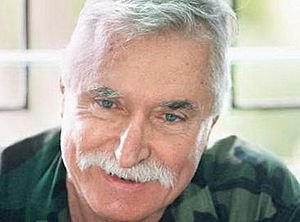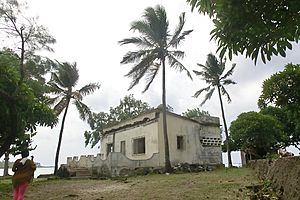Bob Denard facts for kids
Quick facts for kids
Bob Denard
|
|
|---|---|
 |
|
| Other name(s) | Gilbert Bourgeaud Saïd Mustapha Mhadjou |
| Born | 7 April 1929 Grayan-et-l'Hôpital, Gironde, France |
| Died | 13 October 2007 (aged 78) Paris, France |
| Allegiance | |
| Service/ |
French Navy |
| Years of service | Indefinite |
| Rank | De facto military leader of the Comoros and Commander of the Presidential Guard of Ahmed Abdallah Colonel (in the Comorian Armed Forces) |
| Unit | 7 Independent Company (1977–1978) |
| Commands held | Mercenary units |
| Battles/wars | First Indochina War Algerian War Katanga secession Siege of Jadotville North Yemen Civil War Simba Rebellion Operation Crevette Rhodesian Bush War Operation Azalee |
Robert Denard (born Gilbert Bourgeaud; 7 April 1929 – 13 October 2007) was a French soldier who worked as a mercenary. A mercenary is a soldier who fights for money, often for a foreign country or group. Denard was sometimes known by other names like Gilbert Bourgeaud and Saïd Mustapha Mhadjou. He was known for his work in Africa, especially in the Comoros islands. He was the military leader of the Comoros twice, first from 1978 to 1989, and briefly again in 1995.
Denard served in the French Navy during the Algerian War. He was strongly against communism, a political idea where the government controls everything. He took part in a movement to separate Katanga from Congo in the 1960s. Later, he worked in many African countries, including Congo, Angola, Rhodesia (now Zimbabwe), and Gabon. Between 1975 and 1995, he was involved in four attempts to overthrow the government in the Comoro Islands. Many people believe that the French government quietly supported his actions, even after a new president was elected in France in 1981.
Denard was born a Roman Catholic. He later changed his religion to Judaism, then to Islam, and finally returned to Catholicism. He was married seven times and had eight children. He was seen as a brave and adventurous figure. A journalist once called him a "warrior king" because he managed to take control of the Comoros in 1978. He ruled the islands through a president he supported until 1989. Many believed he was one of the most successful and well-known mercenaries in Africa.
Contents
Early Adventures
After serving in the French Navy in Indochina and French Algeria, Denard worked as a colonial policeman in Morocco from 1952 to 1957. In 1954, he was involved in a plot against the French Prime Minister and spent 14 months in jail. After being released, he worked for the French secret services during the Algerian War.
He started his career as a mercenary in Katanga in December 1961. He fought there until the movement to separate Katanga ended in January 1963. After that, Denard and his men went to Portuguese Angola.
In 1963, he was in North Yemen, which was in the middle of a civil war. He joined the royalist side, who were supported by Western countries and Saudi Arabia. Denard helped train the royalist fighters.
After about 18 months, Denard returned to the Congo. He worked for Moïse Tshombe, who was the prime minister. Denard spent two years fighting against rebels known as the Simba rebels. These rebels were supported by China and Cuba, while the government was supported by the United States and Belgium. Denard led his own group of French mercenaries. He became famous for rescuing civilians who were surrounded by rebels. He also helped support a revolt in 1966 and another one in 1967. During the 1967 revolt, he was injured and had to leave.
Denard was also involved in mercenary work in Biafra during the Nigerian civil war in the late 1960s. From 1968 to 1978, he worked for the government in Gabon. He was also available to carry out military actions for the French government in Africa. He was involved in a failed attempt to overthrow the government in Benin in 1977. This attempt was supported by other African leaders who were allies of France.
Denard took part in conflicts in Rhodesia in 1977, as well as in Iran, Nigeria, Angola, Zaire, and the Comoros. The Comoros islands have seen many attempts to overthrow their government over the years. For most of his career, Denard had the quiet support of France and its secret service. France wanted to keep its influence over its former colonies.
The Comoros
Denard was most active in the Comoros, a small group of islands. He made four attempts to overthrow the government there. In 1975, he removed the first president, Ahmed Abdallah, who had just declared the Comoros independent. Abdallah was replaced by Ali Soilih.
After a failed coup in Benin in 1977, Denard worked in Rhodesia from 1977 to 1978. With support from the Rhodesian government, he returned to the Comoros with 43 men on 13 May 1978. He led a coup against President Ali Soilih, who was moving towards socialist policies. Soilih died during the coup. With Denard's help, Ahmed Abdallah became president again. For eleven years (1978-1989), Denard led Abdallah's 500-strong presidential guard. He had a lot of influence and business interests in the islands. He married there, converted to Islam, and became a citizen of the country. He took the Islamic name Said Mustapha Mhadjou.
The Comoros also served as a base for Denard's military operations in Mozambique and Angola. France supported him because the Comoros allowed France to work around the embargo placed on South Africa due to its apartheid policy. Denard gained a lot of property in the Comoros, including hotels and land. He also controlled the presidential guard. Some say Denard helped change the idea of traditional mercenaries into modern private military contractors.
1989 Events
In 1989, President Ahmed Abdallah feared another coup. He signed an order for the Presidential Guard, led by Denard, to disarm the armed forces. Soon after, President Abdallah was shot and died. Denard was also injured at the same time. A few days later, Denard agreed to leave the Comoros. French soldiers helped him go to South Africa.
Denard later faced charges in France for his role in the 1989 events. The French authorities believed President Abdallah was killed on Denard's orders. However, Abdallah's family later dropped their lawsuit. Denard was found not guilty because there was not enough evidence. On the day his trial began, the Comoros experienced its twentieth coup attempt since becoming independent.
Afterward, the new president, Mohamed Taki Abdulkarim, said Denard could not return to the Comoros. In 1998, Abdulkarim died under unclear circumstances. His family suspected poisoning, but an autopsy was not done. It was officially stated that he died of natural causes.
1995 Events
On 27 September 1995, Denard launched another coup attempt in the Comoros. He landed on the islands with 33 men in inflatable boats. He tried to overthrow President Said Mohamed Djohar, who had taken over after Abdallah. On 4 October, the French army ended the attempt. The French government sent soldiers to capture Denard and his mercenaries. Even though Denard had many armed Comorian supporters, he surrendered without a fight. Denard was taken back to France by the French intelligence agency. He spent ten months in a Paris jail.
Later Trials and Death
In 2001, an Italian lawyer tried to prosecute Denard. He was accused of trying to recruit mercenaries in Italy to overthrow the current president of the Comoros, Colonel Azali Assoumani.
In 2006, a prosecutor asked for Denard to be sentenced to five years in prison for the 1995 coup attempt. During the trial, Denard and his helpers tried to convince the court that they had secret support from French authorities. Some said that high-ranking French intelligence officers knew about the coup.
In June 2006, Denard was found guilty of "belonging to a gang who planned to commit a crime." He was given a five-year suspended jail term. This meant he wouldn't go to prison unless he committed another crime. By this time, Denard was suffering from Alzheimer's disease, which affects memory and thinking. The court recognized that the French secret services had a role in the 1995 coup. This was one reason why Denard did not receive a firm prison sentence. A former head of French intelligence even said that "When special services are unable to undertake certain kinds of undercover operation, they use parallel structures. This was the case of Bob Denard." In July 2007, he was sentenced to four years in prison (three of them suspended). However, he never served his sentence due to his health.
His sister announced his death on 14 October 2007. In 2011, a film called Mister Bob was made based on his life story.
Religious Beliefs
Bob Denard was born a Catholic. He later converted to Judaism in Morocco, then to Islam in the Comoros, and finally returned to Catholicism. His funeral was held at a church in Paris.
See also
 In Spanish: Bob Denard para niños
In Spanish: Bob Denard para niños
Images for kids
 | Georgia Louise Harris Brown |
 | Julian Abele |
 | Norma Merrick Sklarek |
 | William Sidney Pittman |



